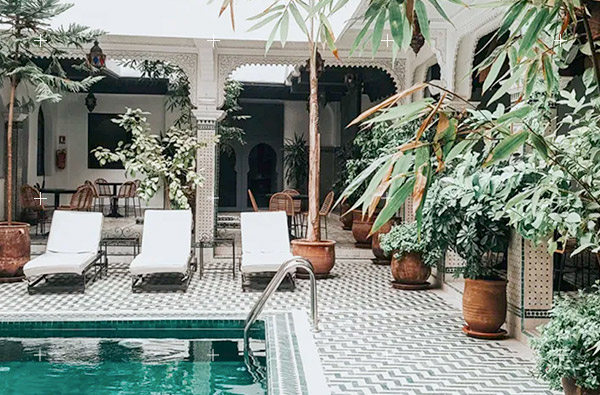Table of contents
Although for many hoteliers around the world the slow recovery is already underway, there are many who still feel the struggle of a constantly changing environment. We think it’s important to also share these stories because it’s obvious that our industry still needs help and that we have a long way to go to return to normality.
The Central House are a boutique hostel chain with properties in five countries around southern Europe and Africa. We spoke to Albert Polo Aibar, General Manager, about the difficulties they’ve had with adapting to a COVID-19 world.
Did you close your properties and have you reopened since?
“In every location we were forced to close. We were about to open new hostels in Budapest and Istanbul but we decided to wait until things improve.
In Barcelona and Lisbon, we opened again on 1st of July. Prior to that in Lisbon, we had a pretty good amount of bookings as Portugal had done a very good job containing COVID-19 and tourism seemed to be willing to go. And then a couple of days before we reopened, there was a second wave in Lisbon and some neighborhoods went into lockdown again. Then for us, it was more or less the same scenario as when the first outbreak happened: a lot of emails, people concerned, a lot of cancellations, a lot of request to change dates.
We decided to keep going and open anyway, but it's not working. I think there’s a huge difference between southern countries like Spain, Portugal, and Italy, because I've been following Germany and the Netherlands, who are reaching 35% to 40% occupancy. Whereas in Lisbon, we are running at 6% occupancy and the prices are back to November prices – it’s very difficult to keep everything open at these prices.
Even if I plan to close everything now and reopen in March, I believe we are going to be maybe 40% or 50% of 2019's numbers, and prices are going to struggle again to get back to 2019, at least for 2021.”
So you’re planning to close your properties again after reopening them?
“Most of the hostels and hotels that opened in our area are about to close again, and that's our case as well. From 1st of August we're closed again because it makes no sense at all to be open with 6% occupancy. In Barcelona it was similar. As we approached the reopening of borders at the end of June, bookings kept coming in, and it was pretty good. We jumped to 25% occupancy, and some weekends we were at 50% occupancy.
Then news came about new waves in Barcelona and measures being taken like wearing a mask, closing the nightclubs and not drinking inside the bars. So we had the same thing as with Lisbon – lots of cancellations. Now we are considering whether we should remain open in Barcelona.”
Are things better outside of big cities?
“We have a hotel in Sitges, which is on the coast. Over there, we don't rely as much on international tourism and we have a pretty good amount of domestic tourism, especially on weekends. When I say weekend, I mean Saturday – one night, that's the best we can expect. But occupancy goes up to 80%. 87% has been the maximum occupancy we've had, but only for one night. For the rest of the week, it remains between 25% to 35%. Prices are like low season prices, but at least we are working and making some money.”
How are you managing your cancellations?
“In Portugal there was a law which meant that hoteliers could offer a voucher instead of giving money back. In any case, if someone wants some money back, you have until the end of 2021 to refund them, so it helped the hoteliers because we were getting a lot of pressure from Booking.com. They started returning money to customers and then putting it on our bill, regardless of your situation. It created a lot of hassle and so they changed a little bit, but at the beginning, which was the worst, it caused some damage.
The way we did contacted customers was with an email campaign for which we created a special video that basically said, "Hey guys, take into consideration that it's a bad situation for us too – we will come back, so please just change your dates." That was the aim of the first email, and they can use that voucher until the end of 2021, so plenty of time.
Then we tried a second email and then a third, and if they still wanted their money back we just gave it to them. At the beginning it was a lot of people asking for the money back because nobody knew what was going to happen, when we'll be able to travel again. Whereas now, everybody's more aware of the situation and almost everybody's willing to take that voucher.”
What changes did you make around the hostels when you reopened?
“We created a lot of signs to help people follow social distancing and anti-bacterial gel is everywhere. Then, the way we organize people in the rooms – surprisingly most of the bookings were for dorms instead of private rooms – so if it’s a four-bed dorm, we only let two people stay there. But when we opened, even though we were wearing masks and we put protective glass in reception, people tend to wander around the hostel like normal, sitting there chatting with each other – and you can’t really say something to them.”
Do you get a lot of last-minute bookings?
“Yeah, we have a lot of late notice bookings and we also have some walk-ins. We also get a very different kind of guest now. Normally we’re highly priced but I guess our niche of customers are not travelling now, or maybe they’re going to double rooms instead of dorms. I’m not saying these guests are better or worse, but it just shows that everything has changed. We’re just grateful that they’re coming.”
How are your staff coping with the changes and uncertainty?
“We've tried, since day one, to keep the communication open, or at least one Zoom meeting a week with all the directors of every place. Even though we closed, they decided to stay at the hostels. In Morocco, the director decided to stay there, and we allowed the maintenance, a cleaner, and another guy in there. There are four living inside the hostel who are coping with it as they can – they’re not even allowed to leave the country but at least they have a swimming pool.
Now that we made the decision to close, it's been hard, honestly. Some of our staff haven’t been working for three months, and they come back for three weeks and then they get the news that we are closing again without knowing if we are going to come back, and you can’t even ask them to wait because you don't actually know.”
It must have been especially hard to keep the community hostel atmosphere.
“Yeah, you can't really have that, firstly because you just don't have enough people staying with you to create that atmosphere, and secondly because you can't run events and things in order to provide that kind of communal spirit either.
But I think people are just eager to go back to normality. What we are seeing here in Barcelona is that most of the bookings are for dorms, not for double rooms. Some days we have the double rooms empty and everyone is in dorms, which is kind of crazy if you’re only thinking of social distancing. I think in particular our demographic – usually 18 to 35 year olds – are the ones who are most eager to travel again and they just don't worry as much about the virus.”
Have there been any positives?
“Our team is a lot closer and more open now. It's like a family trying to survive. Everybody knows everything about our status, which might be a bit frightening, but it also helps everybody to understand what the real situation is. At least you don't have that uncertainty in you, knowing what's going to happen.
Also, there’s a very smart Spanish hotelier who adapted really well. He noticed that at the beginning, the only places that were allowed to be open were supermarkets and places selling food – so he converted the lobby into a grocery store. They started selling fruit and vegetables and things, and why not? At least you're trying something, and if it doesn’t work it doesn’t work, but at least you’ve done everything you could. That’s what we’re trying to do as well: try different options and find a solution for everybody.”
Find out what other hoteliers are doing to adapt and survive in the new world of hospitality. Read our other Hotel Reopening Diaries:
- Postillion Hotels in the Netherlands
- Superbude in Germany
- The Flushing Meadows in Germany
- The Dylan Amsterdam in the Netherlands

2026 Hospitality Industry Outlook
Download now
Table of contents
Hospitality hot takes straight to your inbox



.webp)
